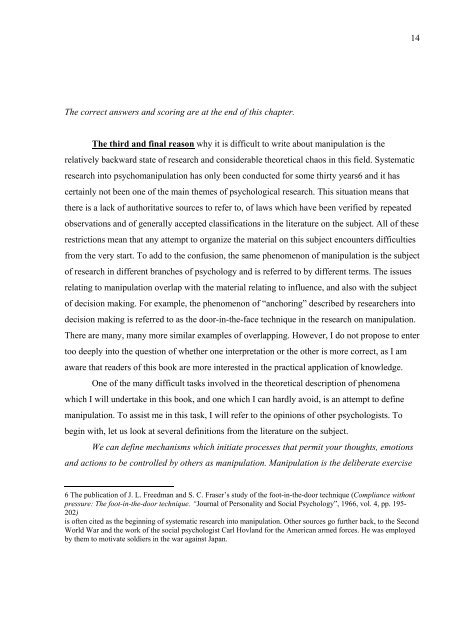PSYCHOMANIPULATION - Tomasz Witkowski
PSYCHOMANIPULATION - Tomasz Witkowski
PSYCHOMANIPULATION - Tomasz Witkowski
You also want an ePaper? Increase the reach of your titles
YUMPU automatically turns print PDFs into web optimized ePapers that Google loves.
The correct answers and scoring are at the end of this chapter.<br />
The third and final reason why it is difficult to write about manipulation is the<br />
relatively backward state of research and considerable theoretical chaos in this field. Systematic<br />
research into psychomanipulation has only been conducted for some thirty years6 and it has<br />
certainly not been one of the main themes of psychological research. This situation means that<br />
there is a lack of authoritative sources to refer to, of laws which have been verified by repeated<br />
observations and of generally accepted classifications in the literature on the subject. All of these<br />
restrictions mean that any attempt to organize the material on this subject encounters difficulties<br />
from the very start. To add to the confusion, the same phenomenon of manipulation is the subject<br />
of research in different branches of psychology and is referred to by different terms. The issues<br />
relating to manipulation overlap with the material relating to influence, and also with the subject<br />
of decision making. For example, the phenomenon of “anchoring” described by researchers into<br />
decision making is referred to as the door-in-the-face technique in the research on manipulation.<br />
There are many, many more similar examples of overlapping. However, I do not propose to enter<br />
too deeply into the question of whether one interpretation or the other is more correct, as I am<br />
aware that readers of this book are more interested in the practical application of knowledge.<br />
One of the many difficult tasks involved in the theoretical description of phenomena<br />
which I will undertake in this book, and one which I can hardly avoid, is an attempt to define<br />
manipulation. To assist me in this task, I will refer to the opinions of other psychologists. To<br />
begin with, let us look at several definitions from the literature on the subject.<br />
We can define mechanisms which initiate processes that permit your thoughts, emotions<br />
and actions to be controlled by others as manipulation. Manipulation is the deliberate exercise<br />
6 The publication of J. L. Freedman and S. C. Fraser’s study of the foot-in-the-door technique (Compliance without<br />
pressure: The foot-in-the-door technique. “Journal of Personality and Social Psychology”, 1966, vol. 4, pp. 195-<br />
202)<br />
is often cited as the beginning of systematic research into manipulation. Other sources go further back, to the Second<br />
World War and the work of the social psychologist Carl Hovland for the American armed forces. He was employed<br />
by them to motivate soldiers in the war against Japan.<br />
14


